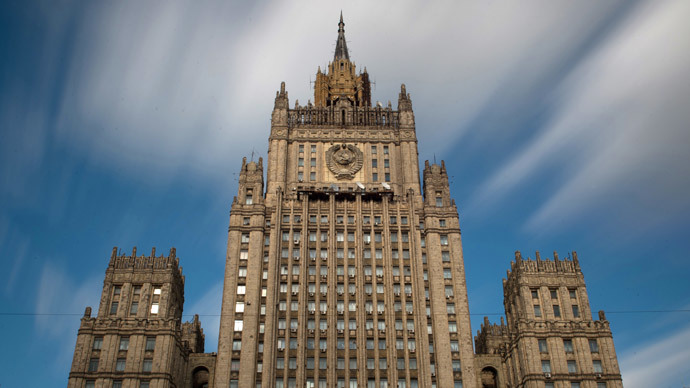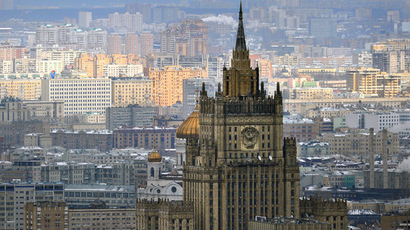‘Lies, hypocrisy, propaganda’: Russia slams US over claims of nuclear treaty violations

Moscow has upped the ante in its growing confrontation with Washington after releasing an incendiary statement, accusing the US of spinning and distorting facts to allege that Russia is testing a new cruise missile, banned by a landmark Cold War treaty.
“Once again the US is trying (and again rather clumsily) to act as a mentor, for some reason pretending to possesses the truth in the last instance and have the right to judge others. Claims are made with little to no evidence and based on warped logic, in other words presented not with further experts’ analyses in mind,” opens the lengthy tirade by the Russian Foreign Ministry, in response to the allegations detailed in the State Department report released on Tuesday.
“The purpose seems to be to create a wall of information noise to incite other countries, and to boil up a propagandist brew for the media. Or does the US administration still sincerely deceive itself that the world can take Washington’s word?”
The US report never specified how exactly Russia violated the treaty, instead offering a vague finding that: “The United States has determined that the Russian Federation is in violation of its obligations under the INF Treaty not to possess, produce, or flight-test a ground-launched cruise missile (GLCM) with a range capability of 500 km to 5,500 km, or to possess or produce launchers of such missiles.”
This would be a direct violation of the Intermediate-Range Nuclear Forces Treaty (INF) signed by Ronald Reagan and Mikhail Gorbachev in 1987, which banned missiles that could carry nuclear warheads in the range of 500-5,500 km. The White House described the supposed transgression as a “very serious matter” of which it has been aware since 2008, again not naming the suspect.
The media in the meantime were quick to allege the missile in question was the R-500 cruise missile with an officially stated range of 500km, which some believe can be easily modified for greater ranges.
Russia previously issued a brief response to the allegations that was dismissive, but called for further dialogue. The latest diatribe, however, makes no attempt to seek common ground, and takes pot shots at the entirety of the US approach to international treaties – repeatedly accusing Washington of duplicity and bad faith.
“American officials cite classified intelligence, when questioned about their findings. The value of such intelligence has been amply proven by the ‘Iraqi weapons of mass destruction’ myth. Such undercover research becomes even less trustworthy, with regular leaks of obviously untrue and provocative pieces of information about the conflict in eastern Ukraine, while data coming from sources beyond US control gets ignored. Years pass, but the Americans have learned nothing.”
The statement then exposes US hypocrisy, who themselves are developing “target practice missiles” similar to missiles in question, as well as drones, which violate the spirit of the INF Treaty.
The American report claims that “all US activities during the reporting period were consistent with the obligations set forth in the INF Treaty. Russia did not raise any new INF Treaty compliance issues during the reporting period.”

But the Russian Foreign Ministry said that Russia repeatedly raised concerns with US short range missiles for target practice, drones and the MK 41 Vertical Launching Systems which the US is planning to deploy in Poland and Romania.
It seems that the current unsubstantiated accusations against Russia are just a “tendentious and provocative’” attempt to create a smokescreen and draw attention away from the Pentagon’s own transgressions, Russia says, going beyond identifying a single specific area of disagreement.
“Washington is systematically carrying out a plan to dismantle the global strategic stability system,” says the ministry, mentioning the global US missile defense system, which will give it a military edge over even other nuclear powers.
“Americans started this process in 2001, by unilaterally withdrawing from the ABM treaty. Now it is aggravated by a rapid and unlimited build-up of US global missile defense system, unwillingness to clean up the territory of other states from the US tactical nuclear arsenal deployed there, elaboration of a provocative strategy of Prompt Global Strike, and an excessive build-up of conventional weapons, including their offensive components,” the statement says.
Russia also highlighted another “paradox” in American policy regarding arms control and non-proliferation.
“Washington initiated the Comprehensive Nuclear-Test-Ban Treaty (CTBT), but it is the United States who has not yet ratified this important agreement,” Russia’s statement says, adding that American nuclear laboratories seem to be actively lobbying for maintaining US nuclear test sites in the state of preparedness for new full-scale nuclear explosions.
Russia also resented insinuations about possible non-compliance with the terms of the Biological and Toxin Weapons Convention (BTWC) and the Chemical Weapons Convention, where Washington has chided Moscow of engaging in dual-use biological activities and providing “incomplete” data about such facilities’ operations.
“They obviously bet on the ignorance of the general public about the fact that the United States has the highest in the world number (up to 5,000) of biosafety level 3 laboratories (BSL-3), of which, according to the US Government Accountability Office, at least 1,356 had a license for work with selected (highly dangerous) pathogenic agents. All of those facilities are dual-use, while selected pathogens are directly relevant to the BTWC,” Moscow said.
Almost one-third of the US report was devoted to the America claims to the implementation by other states of multilateral agreements, including the Open Sky Treaty.
“The report's authors are tripping over themselves to "prove" that Russia has somehow created obstacles to the implementation of the Treaty,” Moscow says, adding that most of the issues presented, of purely “technical” nature, were long ago referred to. The ministry however still rebuffed a couple of further examples, to demonstrate how the facts are “distorted” in the US report.
Finishing off its litany of complaints Russian Foreign Ministry’s document wholly rejects all US objections to Russia’s commitment to international treaties.
“The US report is a catalogue of cooked-up quibbles about others, without a single attempt to look at their own reflection in the mirror.”















